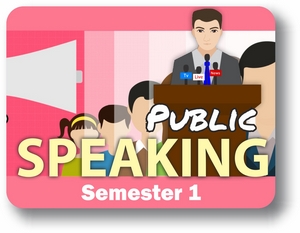
Does the thought of speaking in front of people makes you break out in hives? Maybe you want tips on how to make that first great impression? In both cases, Public Speaking Semester 1: Introduction may be just what you need. In this course, you will learn from famous orators, like Aristotle and Cicero, understand the influence of rhetoric, and discover how to recognize bias, prejudice, and propaganda. You will also learn how to plan a speech, build an argument, and communicate effectively, while collaborating with others. Grab your notes and get ready to conquer public speaking!
Note: This course is not designed for ELL (English Language Learners) students. ELL students may enroll in this course ONLY if they have adequate mentor support at their home school and are able to fulfill all course requirements.
Unit 1: Introduction to Rhetoric
In this unit, you’ll learn about the history of public speaking and rhetoric, including both Aristotle and Cicero’s ideas on what makes a good rhetorical argument. You’ll also begin to look at how to recognize rhetorical devices at work in the speeches of others and how to assess the effectiveness of an argument.
What will you learn in this unit?
Unit 2: The Influence of Rhetoric
In this unit, you’ll learn about how rhetoric influenced the development of democratic and republican political systems in ancient Greece and Rome, which in turn influenced the development of the modern world. You’ll learn about how Hitler used rhetoric for destructive purposes during World War II, as well as how rhetoric has more recently been used to create hope in the American people by Martin Luther King Jr. and Barack Obama. You’ll also begin learning how to recognize bias, prejudice, and propaganda, and how repetition can be used to create an emotional effect.
What will you learn in this unit?
Unit 3: Listening and Analyzing
In this unit, you’ll learn all about how to listen actively to speeches in order to analyze their form and content. You’ll learn about the different types of public speech and their different characteristics and begin learning about how a speech is structured in order to create an emotional effect.
What will you learn in this unit?
Unit 4: Speaking Strategies
In this unit, you’ll learn all about planning speeches including how to identify the purpose of your speech, how to choose an appropriate subject and tone, and how to choose a persuasive angle.
What will you learn in this unit?
Unit 5: Building an Argument
In this unit, you’ll learn how to thoroughly research a topic in order to begin building a strong argument for a speech. This involves learning where to find information as well as how to assess the quality of that information, how to identify bias and vested interests, and how to analyze that information.
What will you learn in this unit?
Unit 6: Using Supporting Materials
When speaking in front of an audience, it’s important to present your material in a way that makes it easy for your audience to view you as an expert on the topic you are presenting. One way to do this is by including relevant and interesting supporting materials in your speech. In this unit, we’ll take a look at what supporting materials are available, the different ways you can present them to your audience, and the most effective ways to use supporting materials to get your point across.
What will you learn in this unit?
Unit 7: Ethics and Public Speaking
With all public speaking, it’s very important that you hold yourself to the highest ethical standards. Ethical considerations should guide you throughout your entire process—from when you choose your topic to how you evaluate your research materials and, finally, to the words you choose when speaking to your audience. In this unit, we’ll take a look at how to be an ethical speaker, how to ethically analyze your sources, how to avoid plagiarism by ethically citing your sources, and some general guidelines for speaking ethically.
What will you learn in this unit?
Unit 8: Outlining Your Speech
When speaking in front of an audience, it’s important to carefully prepare what you plan to say. Creating and using an outline is the most effective way to accomplish this plan. Outlines are a way to succinctly organize the research you’ve done and figure out how you want to use that research in your speech. Your outline will also help you develop strong introductions and conclusions, which you’ll use to gain the audience’s attention before your speech and have your topic stick with them after your speech has concluded.
What will you learn in this unit?
